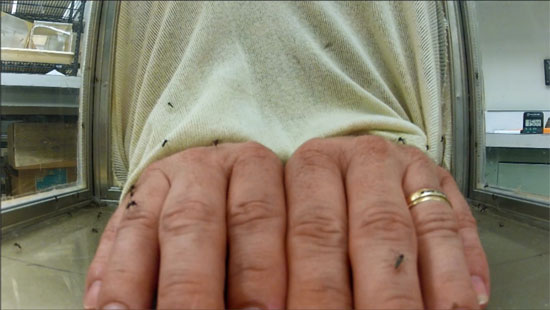Detecting 'invisibility cloak' against mosquitoes
A natural compound found on human skin is expected to effectively replace current anti-mosquito chemicals.
Scientists at the American Chemical Society have revealed a group of naturally released chemical components that can hide human smells for blood-sucking insects including mosquitoes.

Natural chemicals help create mosquito repellents better.(Photo: SPL)
Dr. Ulrich Bernier of the US Department of Agriculture explained that hundreds of skin compounds make up the smell of a person. To look at what smells attract mosquitoes, his team sprayed on different chemicals, then put them inside a cage full of mosquitoes.
The results showed that chemical compounds containing 1-methylpiperzine completely prevent mosquito's sense of smell, the mosquitoes hardly recognize the hand in it.
"Compounds can be added to the composition of cosmetics and body washes, " Dr. Bernier added.
"It is interesting to learn mosquito repellent compounds, although we have many good mosquito repellents on the market, but there is still room for new chemical components," said James Logan School of Hygiene and Tropical medicine, UK, told the BBC.

A hand in a mosquito cage is unattractive when coated with chemicals.(Photo: BBC)
"The challenge of scientists is to improve the effectiveness of current mosquito repellents, they need to work longer, more effectively, at an affordable price, which will bring a lot of benefits. "It will take years for the new product to hit the market," James Logan said.
According to the World Health Organization (WHO), mosquitoes are one of the most dangerous organisms that spread malaria. In 2010 alone, the disease killed about 660,000 people.
- Show the first ultra-thin invisibility shirt
- The US is producing thousands of invisibility cloaks
- Strange technology: Austrian 'stealth' time
- Why is invisibility cloak hard to come true?
- Technology made invisibility cloak with invisible beam
- Invisibility cloaks are coming true
- Stealth laser cloak helps Earth escape aliens
- Invisibility cloak is about to come true
- Perfect invisibility
- Harry Potter's invisibility cloak can become a reality
- Scientists have found a way to make invisible carpet
- The world's first invisibility cloak
 Green tea cleans teeth better than mouthwash?
Green tea cleans teeth better than mouthwash? Death kiss: This is why you should not let anyone kiss your baby's lips
Death kiss: This is why you should not let anyone kiss your baby's lips What is salmonellosis?
What is salmonellosis? Caution should be exercised when using aloe vera through eating and drinking
Caution should be exercised when using aloe vera through eating and drinking